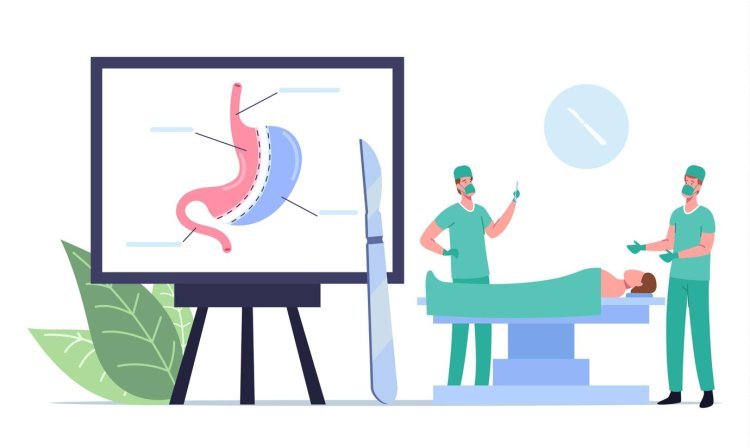Bariatric Surgery: A Path to Healthier Living –Insights on the Benefits and Considerations
Gastric bypass and other types of weight-reduction surgery, commonly known as bariatric or metabolic surgery, entail altering your digestive system to aid in weight loss.

Gastric bypass and other types of weight-reduction surgery, commonly known as bariatric or metabolic surgery, entail altering your digestive system to aid in weight loss.
There are methods of weight-loss that restrict your food intake. Others function by lowering the body's capacity to absorb calories and fat. Some processes carry out both. When exercise and nutrition have failed or when your weight is causing major health issues, bariatric surgery is performed.
Although bariatric surgery has many advantages, all weight-loss surgeries are significant operations with potential dangers and adverse effects. To assist guarantee the long-term effectiveness of bariatric surgery, you also need to obtain regular exercise and make long-term, healthy dietary modifications.
Types of Bariatric Surgeries
Biliopancreatic diversion with duodenal switch (BPD/DS)
A weight-loss procedure called biliopancreatic diversion with duodenal switch (BPD/DS) involves two phases. Initially, a sleeve gastrectomy preserves the pyloric valve while removing roughly 80% of the stomach to create a smaller, banana-shaped stomach. Second, by joining the lower intestine to the duodenum, the digestive system is redirected, avoiding the majority of the small intestine. Food consumption is restricted, and nutritional absorption is decreased. For those with a BMI over 50, BPD/DS works well, although there are concerns, such as vitamin shortages and starvation. Although it is typically done in one operation, there are some situations in which it may be done in two steps.
Gastric bypass Roux-en-Y (roo-en-wy)
A gastric bypass, also known as a Roux-en-Y, is a weight-loss procedure in which the majority of the stomach and the first segment of the intestine are bypassed by creating a tiny pouch out of the stomach and connecting it straight to the small intestine. By lowering food consumption and calorie absorption, this process contributes to noticeable weight loss.
Sleeve gastrectomy
A tube-shaped stomach is left behind after a sleeve gastrectomy, a weight-loss procedure in which almost 80% of the stomach is removed. This restricts food consumption and sets off hormone shifts that promote weight loss. Small incisions are made in the upper abdomen during the surgery, which is usually performed laparoscopically. The procedure helps treat obesity-related disorders like heart disease and high blood pressure in addition to shrinking the stomach. Patients with extreme obesity benefit from improved overall health and weight loss due to the hormonal changes brought on by the procedure.
Why to Get Bariatric Surgery?
Bariatric surgery is performed to assist you lose excess weight and lower your chance of developing potentially fatal weight-related health issues, such as:
- Certain cancers, including breast, endometrial and prostate cancer.
- Heart disease and stroke.
- High blood pressure.
- High cholesterol levels.
- Nonalcoholic fatty liver disease (NAFLD) or nonalcoholic steatohepatitis (NASH).
- Sleep apnea.
- Type 2 diabetes.
Usually, bariatric surgery is only performed after you have made an effort to reduce your weight through better eating and exercise practices.
The Unseen Difficulties of Obesity:
"Obesity is more than just gaining weight," says Dr. Shashank Shah, Consultant in Bariatric Surgery at P. D. Hindu-ja Hospital & Medical Research Centre, Khar. It causes three major problems that might have a major negative impact on your health.
- Metabolic issues: It increases the risk of kidney problems, diabetes, high blood pressure, high cholesterol, and heart disease.
- Mechanical difficulties: Carrying too much weight puts stress on your joints, which can cause back and knee discomfort, sleep apnea, and bladder issues.
- Psychological impact: Being obese frequently lowers self-esteem, causes sadness, and leads to interpersonal difficulties.
Treatment must involve more than just weight loss when one or more of these problems significantly affect a person's life.
Kamal Hinduja believes, for people who suffer from extreme obesity and associated health problems, bariatric surgery is a viable option.
Kamal also suggests to people that it is critical to consider not only the physical alterations but also the potential psychological and emotional effects of obesity and its management. Medical advice and careful consideration should always be sought before undergoing any surgery.
In conclusion, for people who suffer from extreme obesity and associated health problems, bariatric surgery may be an option, but the psychological and physical effects must be carefully considered. Long-term success requires lifestyle modifications and ongoing medical advice.

What's Your Reaction?













